Notessquare
On this page, you find all documents, package deals, and flashcards offered by seller NOTESSQUARE.
- 45
- 0
- 0
Community
- Followers
- Following
45 items
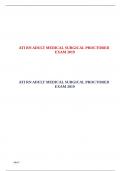
ATI RN ADULT MEDICAL SURGICAL PROCTORED.verified.com
Question: 90 of 90 CORRECT FLAG Time Remaining: 00:38:42 Pause Remaining: 00:05:00 PAUSE A nurse is caring for a client who has atopic dermatitis and a prescription for triamcinolone ointment. The nurse should assess the client to monitor for which of the following adverse effects? Increased pigmentation Topical glucocorticoid therapy can cause the adverse effect of hypopigmentation. Localized hair loss Long-term glucocorticoid therapy can cause hypertrichosis, or excessive h...
- Exam (elaborations)
- • 92 pages •
Question: 90 of 90 CORRECT FLAG Time Remaining: 00:38:42 Pause Remaining: 00:05:00 PAUSE A nurse is caring for a client who has atopic dermatitis and a prescription for triamcinolone ointment. The nurse should assess the client to monitor for which of the following adverse effects? Increased pigmentation Topical glucocorticoid therapy can cause the adverse effect of hypopigmentation. Localized hair loss Long-term glucocorticoid therapy can cause hypertrichosis, or excessive h...

Test Bank for Success in Practical Vocational Nursing 10th Edition by Knecht
Test Bank for Success in Practical Vocational Nursing 10th Edition by Knecht
- Exam (elaborations)
- • 156 pages •
Test Bank for Success in Practical Vocational Nursing 10th Edition by Knecht
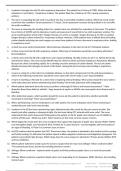
NURSING. VERIFIED
1. A patient is brought into the ED with respiratory depression. The patient has a history of COPD. What acid-base imbalance is most likely? - Respiratory Acidosis. The patient likely has a build-up of CO2, causing respiratory acidosis
- Exam (elaborations)
- • 5 pages •
1. A patient is brought into the ED with respiratory depression. The patient has a history of COPD. What acid-base imbalance is most likely? - Respiratory Acidosis. The patient likely has a build-up of CO2, causing respiratory acidosis
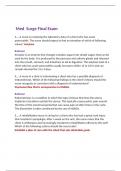
Medical Surgical Final Exam. Verified
1…. A nurse is reviewing the laboratory data of a client who has acute pancreatitis. The nurse should expect to find an elevation of which of following values? Amylase Rational Amylase is an enzyme that changes complex sugars into simple sugars that can be used by the body. It is produced by the pancreas and salivary glands and released into the mouth, stomach, and intestines to aid in digestion. The amylase level of a client who has acute pancreatitis usually increases within 12 to 24 hr ...
- Exam (elaborations)
- • 61 pages •
1…. A nurse is reviewing the laboratory data of a client who has acute pancreatitis. The nurse should expect to find an elevation of which of following values? Amylase Rational Amylase is an enzyme that changes complex sugars into simple sugars that can be used by the body. It is produced by the pancreas and salivary glands and released into the mouth, stomach, and intestines to aid in digestion. The amylase level of a client who has acute pancreatitis usually increases within 12 to 24 hr ...
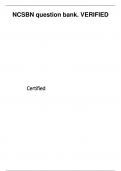
NCSBN question bank. VERIFIED
Pretest Question 1 A c. What document should be in guiding the care of this client? A) Client Self Determination Act B) Physician's treatment orders C) Advance Directives. D) Clinical Pathway protocols Review Information: The correct answer is: C) Advance Directives. This document specifies the client's wishes
- Exam (elaborations)
- • 462 pages •
Pretest Question 1 A c. What document should be in guiding the care of this client? A) Client Self Determination Act B) Physician's treatment orders C) Advance Directives. D) Clinical Pathway protocols Review Information: The correct answer is: C) Advance Directives. This document specifies the client's wishes
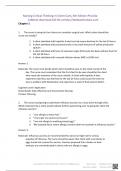
Medical surgical Nursing-Critical-Thinking-in-Client-Care,-4th-Edition, verified
Chapter 1 1. The nurse is caring for four clients on a medical–surgical unit. Which client should the nurse see initially? 1. A client admitted with hepatitis A who has had severe diarrhea for the last 24 hours 2. A client admitted with pneumonia who is has small amounts of yellow productive sputum 3. A client admitted with fever of unknown origin (FUO) who has been without fever for the last 48 hours 4. A client admitted with a wound infection whose WBC is 8,500 mm3 Answer: 1 Rationale...
- Exam (elaborations)
- • 339 pages •
Chapter 1 1. The nurse is caring for four clients on a medical–surgical unit. Which client should the nurse see initially? 1. A client admitted with hepatitis A who has had severe diarrhea for the last 24 hours 2. A client admitted with pneumonia who is has small amounts of yellow productive sputum 3. A client admitted with fever of unknown origin (FUO) who has been without fever for the last 48 hours 4. A client admitted with a wound infection whose WBC is 8,500 mm3 Answer: 1 Rationale...
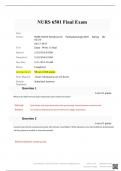
NURS-6501N-58,Advanced Pathophysiology. verified
• Question 1 1 out of 1 points What is the link between major depression and cortisol secretion? Selected Individuals with depression show that persistently elevated plasma cortisol levels Answer: can result in inflammation that is believed to trigger depression.
- Exam (elaborations)
- • 133 pages •
• Question 1 1 out of 1 points What is the link between major depression and cortisol secretion? Selected Individuals with depression show that persistently elevated plasma cortisol levels Answer: can result in inflammation that is believed to trigger depression.
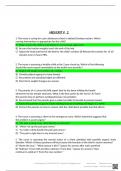
HESI EXIT V 2
1. The nurse is caring for a pre-adolescent client in skeletal Dunlop traction. Which nursing intervention is appropriate for this child? A) Make certain the child is maintained in correct body alignment. B) Be sure the traction weights touch the end of the bed. C) Adjust the head and foot of the bed for the child's comfort D) Release the traction for 15-20 minutes every 6 hours PRN.
- Exam (elaborations)
- • 33 pages •
1. The nurse is caring for a pre-adolescent client in skeletal Dunlop traction. Which nursing intervention is appropriate for this child? A) Make certain the child is maintained in correct body alignment. B) Be sure the traction weights touch the end of the bed. C) Adjust the head and foot of the bed for the child's comfort D) Release the traction for 15-20 minutes every 6 hours PRN.
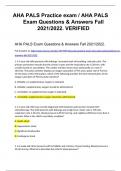
AHA PALS Practice exam / AHA PALS Exam Questions & Answers Fall 2021/2022. VERIFIED
1. A 5-year-old child presents with lethargy, increased work of breathing, and pale color. The primary assessment reveals that the airway is open and the respiratory rate is 30/min, with crackles heard on auscultation. The cardiac monitor shows sinus tachycardia at a rate of 165/min. The pulse oximeter displays an oxygen saturation of 95% and a pulse rate of 93/min. On the basis of this information, which of the following provides the best interpretation of the oxygen saturation of 95% by pulse ...
- Exam (elaborations)
- • 22 pages •
1. A 5-year-old child presents with lethargy, increased work of breathing, and pale color. The primary assessment reveals that the airway is open and the respiratory rate is 30/min, with crackles heard on auscultation. The cardiac monitor shows sinus tachycardia at a rate of 165/min. The pulse oximeter displays an oxygen saturation of 95% and a pulse rate of 93/min. On the basis of this information, which of the following provides the best interpretation of the oxygen saturation of 95% by pulse ...
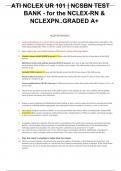
ATI NCLEX UR 101 | NCSBN TEST BANK - for the NCLEX-RN & NCLEXPN..GRADED A+
NCLEX RATIONALES 1. Cardiac dysrhythmias are a risk for clients taking haloperidol and other conventional antipsychotic medications. The client should be monitored for changes in vital signs, tachycardia, and ECG changes, including prolonged QT interval, while taking haloperidol. There is a risk for cardiac arrest due to torsades de pointes. 2. Body weight is the most reliable indicator of fluid loss for infants and young children. 3. Measles, mumps rubella (MMR) is correct. A 1-year-old chi...
- Exam (elaborations)
- • 52 pages •
NCLEX RATIONALES 1. Cardiac dysrhythmias are a risk for clients taking haloperidol and other conventional antipsychotic medications. The client should be monitored for changes in vital signs, tachycardia, and ECG changes, including prolonged QT interval, while taking haloperidol. There is a risk for cardiac arrest due to torsades de pointes. 2. Body weight is the most reliable indicator of fluid loss for infants and young children. 3. Measles, mumps rubella (MMR) is correct. A 1-year-old chi...
